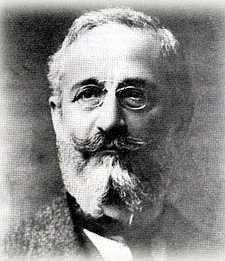| Profile | Major Works | Resources |
Antonio de Viti de Marco, 1858-1943

Italian public finance economist.
Originating from Lecce, Apulia, Antonio de Viti de Marco was of noble extraction, an Italian marchese. He studied law at La Sapienza in Rome, where he struck up a friendship with fellow student Maffaeo Pantaleoni. After graduating in 1881, De Viti de Marco held posts at various universities (Macerata, Pavia), finally settling in 1897 as professor in economics and public finance at the University of Rome. De Viti de Marco was one of the founding editors of the new Giornale degli economisti (in its "Roman" series, from 1890).
Antonio de Viti de Marco is perhaps best known for his 1888 treatise on public finance, which is considered a classic of the Italian "Fiscalist" school (later reworked and restated in 1923 and 1939). Going beyond Ferrara, De Viti De Marco attempted to apply "pure" Neoclassical economics to public finance. The essence of De Viti De Marco's approach was to regard that State as an economic actor who attempts to produce "collective" consumption goods at minimum cost. He regarded taxes as the "price" of publicly-provided goods in a collective choice problem. However, he did not attempt to break the State's choices down to the choices of individuals in the nation. That, he felt, was a question of politics. As far as economics is concerned, de Viti de Marco argued, State fiscal activity must be regarded as a rational collective decision-making.
De Viti de Marco has also been credited with developing the "Ricardian equivalence" theory of public debt in an 1893 GdE article. He was highly influential on Ugo Mazzola and Luigi Einaudi. James Buchanan regards de Viti de Marco as an important anticipator of the Public Choice school.
A ardent proponent of laissez-faire and proportional taxation, De Viti de Marco was elected to the Italian parliament in 1900 for the Radical Party and railed against the protectionist policies of recent governments. A staunch liberal, De Viti de Marco could not brook the rise of fascism and resigned his academic positions in 1931, rather than swear an oath of loyalty to the fascist regime.
|
Major Works of Antonio de Viti de Marco
|
|
HET
|
|
Resources on de Viti de Marco
|
All rights reserved, Gonšalo L. Fonseca
